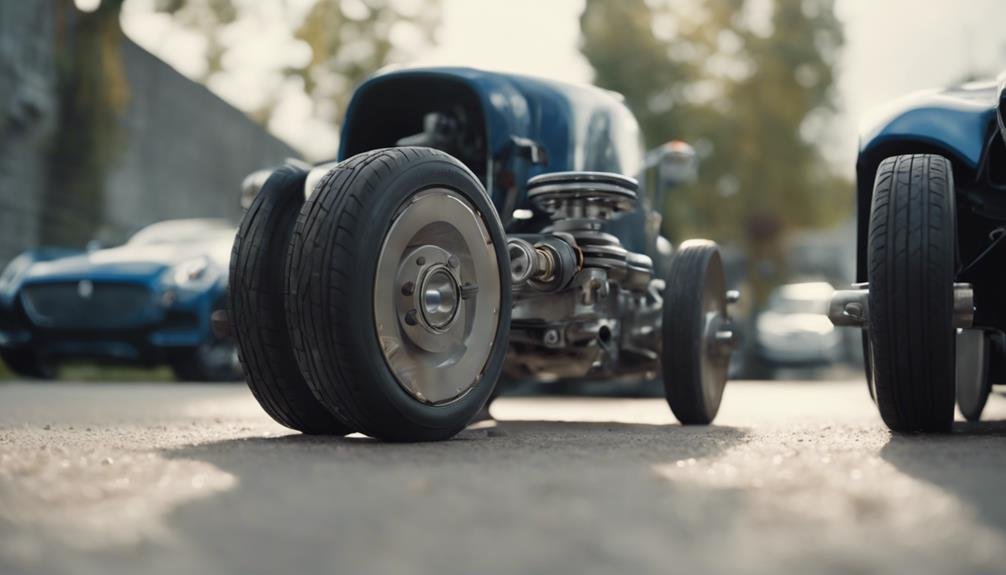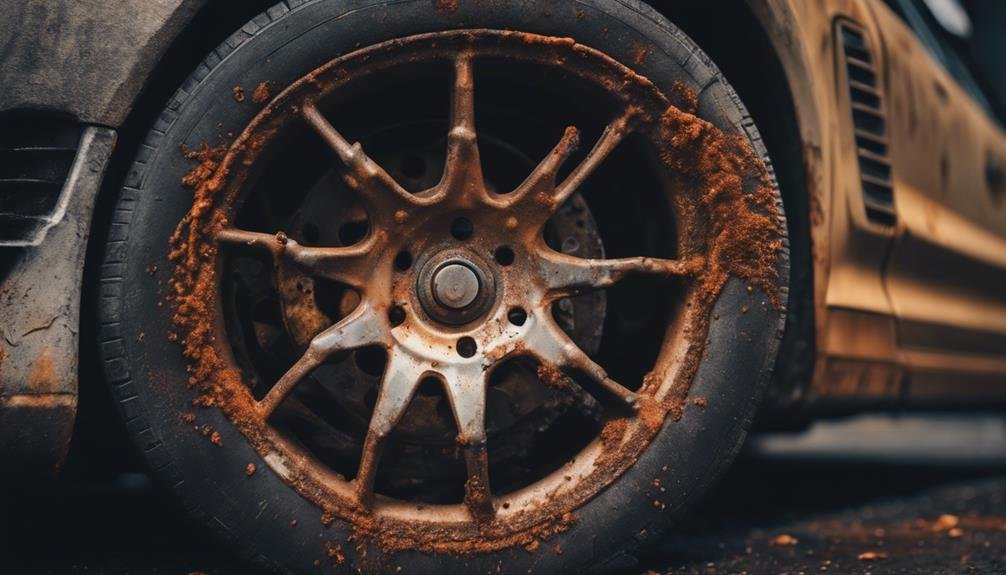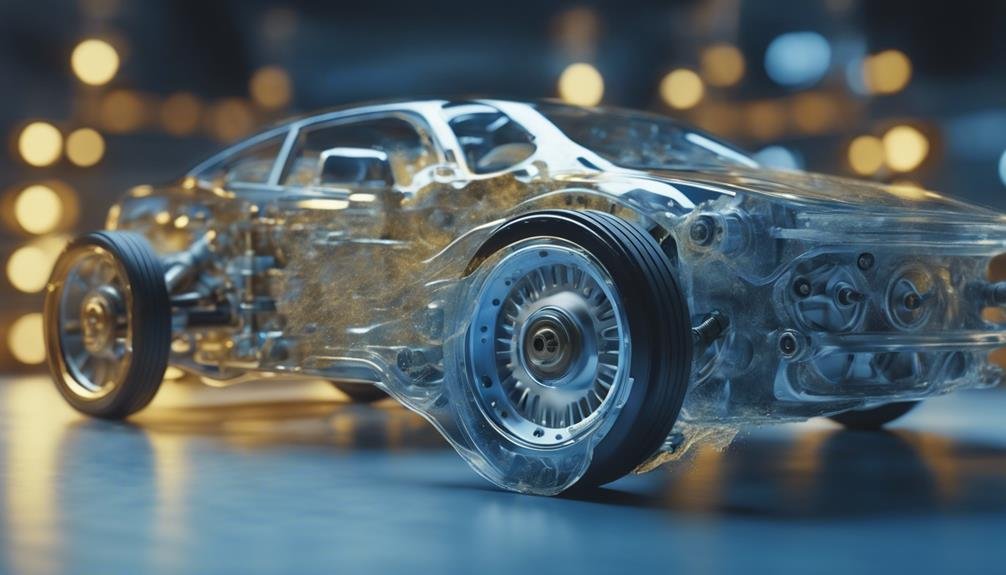In your vehicle, a differential is a vital system that allows your wheels to rotate at different speeds, distributing power from the driveshaft to the wheels and adjusting for varying speeds and traction conditions, making it important for smooth driving around corners and curves. By permitting wheels to rotate at different speeds, it guarantees equal torque distribution and prevents wheel slippage on different surfaces, enhancing traction and handling. As you delve further, you'll uncover the intricacies of differential types, maintenance, and troubleshooting, which can greatly impact your driving experience.
Key Takeaways
- A differential is a device that enables wheels to rotate at different speeds, essential for smooth turning and traction control in cars.
- It distributes power from the driveshaft to the wheels, adjusting for varying speeds and traction conditions, especially in rear-wheel-drive and four-wheel-drive vehicles.
- The differential allows the outside wheel to rotate faster than the inside wheel during turns, ensuring equal torque distribution and maintaining traction on slippery surfaces.
- There are different types of differentials, including open, limited-slip, and torque-vectoring, each suited for specific driving conditions, vehicle usage, and performance needs.
- Regular maintenance, including lubrication and fluid changes, is crucial for peak performance, prolonged lifespan, and preventing premature wear and damage to the differential.
Definition and Function of a Differential
As you navigate through winding roads or make sharp turns, the differential in your car plays an important role in guaranteeing a smooth and stable ride by allowing your wheels to rotate at different speeds. This clever system distributes power from the driveshaft to your wheels, adjusting for varying speeds and traction conditions.
Without it, your vehicle would struggle to turn, experiencing wheel slippage and handling issues. The differential is particularly essential for rear-wheel-drive and four-wheel-drive vehicles, where it improves driving performance and stability. Essentially, it's a device that enables your wheels to rotate at different speeds, making it possible to drive smoothly around corners and curves.
How Differentials Work in Cars
You're likely curious about the inner workings of the differential, so let's take a closer look at how it distributes power to your wheels.
The differential plays a significant role in allowing your wheels to rotate at different speeds, which is necessary for smooth turning. When you turn, the outside wheel needs to travel a longer distance than the inside wheel, and the differential adjusts the power distribution to accommodate this.
Inside the differential, a powered pinion gear engages with the ring gear, transmitting torque to the drive wheels. As you turn, the differential adjusts the speed of each wheel, ensuring equal torque distribution and maintaining traction. This is particularly crucial on slippery surfaces, where uneven traction can cause loss of control.
Types of Differentials in Vehicles

When it pertains to differentials, there are several types designed to cater to specific driving needs, and understanding their unique characteristics is crucial for peak vehicle performance.
You'll find that open differentials are the most common type, distributing power to both wheels but favoring the one with less traction.
However, if you're driving a high-performance or heavy load vehicle, limited-slip differentials are the way to go. These differentials use a clutch system to lock the axle sides together, providing improved traction and stability.
For the most advanced traction control, torque-vectoring differentials use sensors and electronics to distribute power based on data, ideal for high-performance drive vehicles.
Whether you're driving a rear-wheel drive or all-wheel drive vehicle, the type of differential you have will greatly impact your driving experience.
Choosing the right differential for your vehicle depends on factors like driving conditions, vehicle usage, and performance requirements. By understanding the characteristics of each type, you'll be able to make an informed decision and optimize your vehicle's performance.
Importance of Differential Maintenance
With the right type of differential in place, it's just as important to maintain it properly to guarantee peak performance and prolong its lifespan. You'll want to prioritize differential maintenance to make sure your vehicle runs smoothly and efficiently. Regular maintenance ensures proper lubrication of gears and bearings, which is critical for best performance. By doing so, you'll prevent premature wear and damage to key components, saving you from costly repairs down the line.
It's necessary to check and change the differential fluid at recommended intervals to extend the differential's lifespan. Moreover, proper maintenance of seals and bearings prevents contamination, preserving the differential's functionality. By staying on top of differential maintenance, you'll enjoy safe driving, improved handling, and overall better vehicle performance. Remember, neglecting maintenance can lead to premature wear, contamination, and even complete failure.
Signs of a Failing Differential

One of the most critical steps in maintaining your vehicle's differential is recognizing the warning signs of a failing differential, as timely intervention can prevent costly repairs. Ignoring these signs can lead to drive train damage and costly repairs. So, what are the signs of a failing differential?
| Sign | Description | Consequence |
|---|---|---|
| Unusual Noises | Grinding, clunking, or howling sounds | Indicates worn or damaged gears or bearings |
| Vibrations | Vibrations, especially when accelerating or turning | Can cause loss of control or accidents |
| Difficulty Turning | Struggling to turn, especially during sharp corners | Can indicate worn or damaged differential components |
| Uneven Tire Wear | One tire wears out faster than the others | Can lead to uneven tire wear and reduced vehicle performance |
If you notice any of these signs, it's crucial to have your differential checked and serviced promptly. Failing to do so can result in costly repairs and even drive train damage. By recognizing these signs and taking timely action, you can save yourself from unnecessary expenses and ensure your vehicle runs smoothly and efficiently.
Repair and Replacement Options
You have various options to investigate when your differential needs repair or replacement, ranging from fixing worn gears to upgrading to a high-performance limited-slip unit. When dealing with differential repair, you may need to address issues like worn gears, damaged bearings, or housing leaks.
- Differential repair may involve replacing damaged bearings or fixing worn gears.
- Upgrading to a limited-slip or locking differential can improve traction and performance.
- Replacement options include new OEM parts, aftermarket upgrades, or rebuilt units.
- Regular maintenance can help avoid the need for costly repairs or replacements in the future.
It's crucial to have an experienced mechanic or automotive technician handle the repairs, as they require specialized knowledge and skills.
Upgrading to a high-performance limited-slip differential can greatly improve your vehicle's traction and performance. Remember, regular maintenance is key to preventing expensive repairs or replacements down the line.
Differential Fluid and Its Importance

After upgrading or repairing your differential, it's time to focus on the vital role differential fluid plays in keeping your vehicle's differential system running smoothly. This specialized oil lubricates gears, cools components, reduces friction, and prevents wear and heat buildup. By doing so, it guarantees top performance and longevity of the differential.
| Function | Description |
|---|---|
| Lubrication | Lubricates gears to reduce friction and wear |
| Cooling | Cools components to prevent heat buildup |
| Corrosion Protection | Protects against corrosion and rust within the differential assembly |
Regularly changing the differential fluid is essential to maintaining top performance and longevity of the differential. Proper fluid levels ensure smooth operation and prevent damage to the differential gears and bearings. Neglecting to change the fluid can lead to premature wear, overheating, and corrosion, resulting in costly repairs. By understanding the importance of differential fluid, you can take proactive steps to maintain your vehicle's differential system and ensure a smooth ride.
Common Problems With Differentials
Several issues can plague your differential, including fluid leaks, worn gears, and damaged bearings, which can lead to a range of frustrating problems. If you neglect to address these issues, you may start to notice some unsettling symptoms.
- You might hear whining noises or clunking sounds when you're driving,
- Feel vibrations through the steering wheel or seat,
- Experience difficulty turning, or
- Notice a decrease in your vehicle's general performance.
These problems can be caused by a lack of lubrication, which is crucial for your differential's smooth operation. If you don't check your differential fluid levels regularly, you might be setting yourself up for costly repairs down the line.
Frequently Asked Questions
What Is the Purpose of Differential in a Car?
You're wondering what the purpose of a differential in a car is – it's to enable smooth turns by allowing wheels to rotate at different speeds, ensuring traction, control, and efficient power delivery to both wheels.
What Happens When Your Differential Goes Bad?
When your differential goes bad, you'll notice weird noises, vibrations, and turning difficulties. If you don't address it, you'll face uneven tire wear, drivetrain damage, and costly repairs, putting your safety on the road at risk.
Is It OK to Drive With a Bad Differential?
Don't risk it – driving with a bad differential isn't okay, as it can cause further damage, safety hazards, and compromised vehicle handling. You should get it checked and repaired promptly to avoid costly repairs and guarantee safe driving.
Is It Expensive to Fix a Differential?
You'll likely spend between $200 and $1500 to fix your differential, depending on the damage and type, with rear differentials often being more expensive due to their complexity.
Conclusion
Now that you've learned about differentials, you understand their vital role in your car's performance and safety.
By grasping how they work, the types available, and the importance of maintenance, you're better equipped to identify potential issues and address them promptly.
Remember, a well-maintained differential guarantees a smoother ride, improved traction, and reduced wear on other components.
Stay on top of your car's differential health to guarantee a safer, more enjoyable driving experience.
